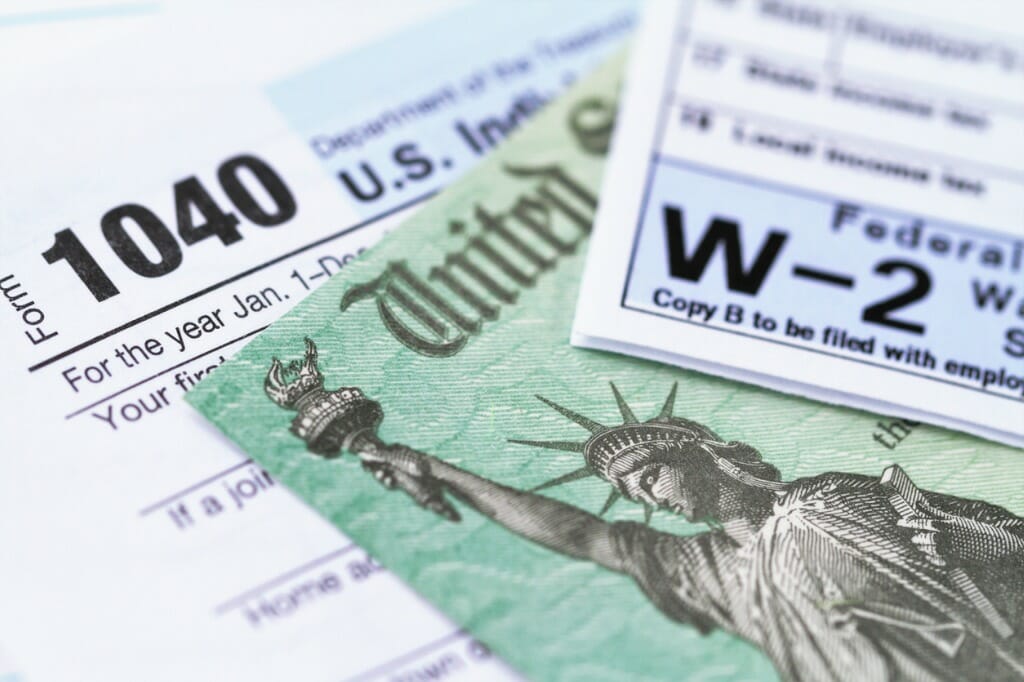How To Get An Extension On Taxes 2021

Due to the COVID-19 pandemic, the federal government extended this year's federal income tax filing deadline from April 15, 2021, to May 17, 2021. In addition the IRS further extended the deadline for Texas, Oklahoma and Louisiana residents to June 15. These extensions are automatic and applies to filing and payments.
If you need more time than the May 17 or June 15 deadlines, you can file for an extension to Oct. 15 with Form 4868. The deadline to submit this form is April 15. This extension, however, is only for filing – it does not apply to payments. So if you owe money for 2019, an extension will not buy you more time. You will still owe penalties and interest if you don't pay by May 17.
Taxes likely won't be the only aspect of your finances to be affected by the COVID-19 pandemic. Talk to a financial advisor about your plans today.
Tax Deadline Extension: What Is Extended for 2021
The IRS gave residents and businesses of Texas, Oklahoma and Louisiana extra time because a severe mid-February winter storm left millions without power and water.
On March 17, 2021, the IRS officially extended the federal income tax filing deadline from April 15 to May 17. That means taxpayers who owe money don't need to file a tax return until this date, and if they owe money they don't need to make payments until then.
This extension applies to all filers, including individuals, businesses, trusts, estates and more. It applies regardless of the amount you might owe, and payments will not incur additional penalties or interest up until May 17. This extension is automatic, meaning taxpayers do not need to file any additional forms to take advantage of it.
The May 17 extension could provide some significant benefits for taxpayers looking to save for retirement through an IRA. That's because the normal April 15 income tax deadline is also the IRA contribution deadline. In turn, the new May 17 due date would simultaneously push back the 2019 IRA contribution deadline.
For reference, the 2020 standard IRA contribution limit is still $6,000, or $7,000 if you are 50 or older. If you've already maxed out your contribution for the 2020 tax year, you can contribute toward the 2021 tax year, for which the limit is also $6,000.
This extension does not apply to 401(k) retirement savings accounts.
What Doesn't the Tax Deadline Extension Apply to?

Remember that the federal government's May 17 income tax deadline extension only applies to your federal taxes. Most states have left their normal tax deadlines in place, but five states (Delaware, Hawaii, Iowa, Pennsylvania and Virginia) have later tax filing deadlines.
Find your state government's tax agency website on the Federation of Tax Administrators' list to learn more.
| 2021 State Income Tax Deadlines (for 2020 Tax Returns) | |||
| State | Deadline | ||
| Alabama | May 17, 2021 | ||
| Alaska | No state return necessary | ||
| Arizona | May 17, 2021 | ||
| Arkansas | May 17, 2021 | ||
| California | May 17, 2021 | ||
| Colorado | May 17, 2021 | ||
| Connecticut | May 17, 2021 | ||
| Delaware | May 17, 2021 | ||
| District of Columbia | May 17, 2021 | ||
| Florida | No state return necessary | ||
| Georgia | May 17, 2021 | ||
| Hawaii | April 20, 2021 | ||
| Idaho | May 17, 2021 | ||
| Illinois | May 17, 2021 | ||
| Indiana | May 17, 2021 | ||
| Iowa | June 1, 2021 | ||
| Kansas | May 17, 2021 | ||
| Kentucky | May 17, 2021 | ||
| Louisiana | June 15, 2021 | ||
| Maine | May 17, 2021 | ||
| Maryland | July 15, 2021 | ||
| Massachusetts | May 17, 2021 | ||
| Michigan | May 17, 2021 | ||
| Minnesota | May 17, 2021 | ||
| Mississippi | May 17, 2021 | ||
| Missouri | May 17, 2021 | ||
| Montana | May 17, 2021 | ||
| Nebraska | May 17, 2021 | ||
| Nevada | No state return necessary | ||
| New Hampshire | No state return necessary | ||
| New Jersey | May 17, 2021 | ||
| New Mexico | May 17, 2021 | ||
| New York | May 17, 2021 | ||
| North Carolina | May 17, 2021 | ||
| North Dakota | May 17, 2021 | ||
| Ohio | May 17, 2021 | ||
| Oklahoma | June 15, 2021 | ||
| Oregon | May 17, 2021 | ||
| Pennsylvania | May 17, 2021 | ||
| Rhode Island | May 17, 2021 | ||
| South Carolina | May 17, 2021 | ||
| South Dakota | No state return necessary | ||
| Tennessee | No state return necessary | ||
| Texas | No state return necessary | ||
| Utah | May 17, 2021 | ||
| Vermont | May 17, 2021 | ||
| Virginia | May 17, 2021 | ||
| Washington | No state return necessary | ||
| West Virginia | May 17, 2021 | ||
| Wisconsin | May 17, 2021 | ||
| Wyoming | No state return necessary | ||
If you need even more time to complete your 2020 federal returns you can request an extension to Oct. 15 by filing Form 4868 through your tax professional, tax software or using the Free File link on IRS.gov. Filing Form 4868 gives taxpayers until Oct. 15 to file their 2021 tax return but does not grant an extension of time to pay taxes due. Taxpayers should pay their federal income tax due by May 17, 2021, to avoid interest and penalties.
If you mail in your return, it must be postmarked May 17 or sooner. Here's a tax refund schedule to give you an idea when to expect your refund after you've filed. If you cannot file your tax return by the deadline, you need to file for a tax extension by May 17, 2021.
It's also important to note that the income tax refund schedule remains unchanged. This serves as an incentive for people to still file sooner rather than later.
How Will the Tax Deadline Extension Affect Taxpayers?
Whether you're filing as an individual, a business, a trust, an estate or anything else, your 2020 tax year federal tax filing and payment deadline is now May 17. You won't need to take any action in order to take advantage of this extension.
However, the federal government recommends that taxpayers file their taxes as soon as possible, particularly those who are expecting tax refunds. Earlier in the year, U.S. Treasury Secretary Steve Mnuchin said that he wanted those refunds to get into people's hands as soon as possible. This influx of cash is a great way for people to cushion the financial hit from the pandemic.
Reasons for the Tax Deadline Extension
Many Americans file their taxes online and never meet an accountant face to face. For these individuals, there is minimal, if any, risk of directly spreading COVID-19 through the filing process. However, not all Americans have this luxury, as many individuals need to meet with an accountant in person. Many free tax preparation services, like Volunteer Income Tax Assistance (VITA) and Tax Counseling for the Elderly (TCE), are held in public spaces and may be currently inaccessible.
The extension also gives people extra time to gather their records or access a computer. These are key in helping people file electronically, which is the optimal way to speed up the refund process. Although these reasons might seem fairly trivial, the newly introduced practices of social distancing can makes things much more difficult. Therefore, an extension affords people a little extra time to get their taxes and financial affairs in order.
Perhaps most importantly, the extension may be crucial for taxpayers who owe the government money. The coronavirus pandemic has already had a significant negative impact on the economy, including business closures and job losses. Those who are experiencing financial pressures likely appreciate the extra time.
Bottom Line

The extension of the federal income tax filing and payment deadline to May 17 is completely automatic. But if you need more time, you will need to file for an extension with Form 4868. This extension is for six months and applies only to filing. Your federal taxes are still due on May 17, so if you don't pay them by then, you will incur penalties and interest.
Dealing With Economic Uncertainty
- The coronavirus pandemic has pushed millions into unemployment and the economy into a recession. Financial advisors can help navigate these troubled times. To simplify the search, use SmartAsset's free tool. It will match you with financial advisors in your area in just 5 minutes. If you're ready to find an advisor, get started now.
- There are certain personal finance fundamentals that you need to get in order, ideally before a recession hits. Here's how to prepare for a recession.
- Extending the tax deadline isn't the only thing the government is doing to take the economic pressure off Americans. Learn what relief is available to you.
Photo credit: ©iStock.com/NoDerog, ©iStock.com/Pra-chid, ©iStock.com/Michail_Petrov-96
Sam Lipscomb, CEPF® Sam Lipscomb is a writer for SmartAsset. His work spans a wide variety of personal finance topics with expertise including retirement, investing and savings. He is particularly well versed in credit cards. Sam has been featured in The Economist and on The Points Guy. He is a Certified Educator in Personal Finance (CEPF®). Sam graduated from Kenyon College with a degree in Economics and enjoys being a go-to resource for family and friends when it comes to personal finance. Originally from Washington, DC, Sam loves all things aviation and is a Cleveland sports fan. He currently lives in New York.
How To Get An Extension On Taxes 2021
Source: https://smartasset.com/taxes/tax-deadline-extension
Posted by: messerhusad1974.blogspot.com

0 Response to "How To Get An Extension On Taxes 2021"
Post a Comment